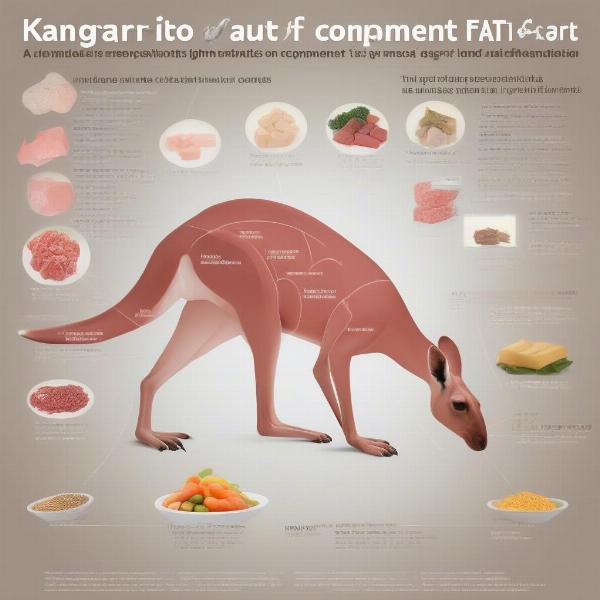Kangaroo food for dogs is gaining popularity as a novel protein source. But is it right for your canine companion? This comprehensive guide explores the benefits, potential drawbacks, and everything you need to know about feeding your dog kangaroo meat. We’ll cover nutritional information, suitability for different breeds and ages, and address common concerns surrounding this unique dog food option.
The Nutritional Benefits of Kangaroo Meat for Dogs
Kangaroo meat is a lean, high-protein, low-fat option that can be a great addition to a dog’s diet. It’s packed with essential nutrients like iron, zinc, and B vitamins, contributing to a healthy coat, strong muscles, and overall well-being. The low-fat content makes it a suitable choice for overweight dogs or those prone to pancreatitis. Furthermore, kangaroo is a novel protein, meaning it’s less likely to trigger allergic reactions in dogs with food sensitivities.
 Kangaroo Meat Nutritional Chart
Kangaroo Meat Nutritional Chart
Is Kangaroo Food Suitable for All Dogs?
While kangaroo food offers many benefits, it’s important to consider your dog’s individual needs. Puppies, adult dogs, and senior dogs can all benefit from the nutritional value of kangaroo, but portion sizes and specific formulations may vary. Always consult with your veterinarian before making significant dietary changes, especially if your dog has pre-existing health conditions. They can help determine if kangaroo food aligns with your dog’s specific requirements.
Addressing Common Concerns About Kangaroo Dog Food
Some dog owners express concerns about the ethical sourcing of kangaroo meat. Reputable kangaroo dog food brands prioritize sustainable harvesting practices, ensuring animal welfare. Look for certifications and transparency from manufacturers regarding their sourcing methods. Another concern is the potential for contamination. Just like any other meat source, proper handling and processing are crucial to prevent bacterial contamination. Choose kangaroo dog food from trusted brands that adhere to strict quality control standards.
Transitioning Your Dog to Kangaroo Food
Introducing any new food to your dog’s diet should be done gradually. Start by mixing a small amount of kangaroo food with their current food, slowly increasing the proportion of kangaroo over several days or weeks. This gradual transition helps prevent digestive upset and allows your dog to adjust to the new taste and texture. Monitor your dog for any signs of allergies or digestive issues during the transition period.
Choosing the Right Kangaroo Dog Food
The market offers a variety of kangaroo dog food options, including dry kibble, wet food, and treats. limited ingredient dog food When selecting a kangaroo-based diet, consider your dog’s age, breed, activity level, and any specific dietary needs. Look for high-quality ingredients, avoiding artificial colors, flavors, and preservatives. Reading online reviews and seeking recommendations from your veterinarian can help you make informed decisions.
Conclusion
Kangaroo food can be a healthy and nutritious option for many dogs. Its lean protein, low fat content, and novel protein status make it a valuable alternative for dogs with allergies or specific dietary needs. By carefully considering your dog’s individual needs and choosing a high-quality product, you can provide your canine companion with a delicious and beneficial diet. Remember to consult your veterinarian before making any significant dietary changes.
FAQ
- Is kangaroo food expensive? Kangaroo meat can be slightly more expensive than traditional protein sources like chicken or beef, reflecting its sustainable sourcing and nutritional benefits.
- Where can I buy kangaroo dog food? Kangaroo dog food is increasingly available in pet stores and online retailers.
- Can I feed my dog raw kangaroo meat? While some dog owners feed raw diets, there are potential risks associated with raw meat, including bacterial contamination. Consult with your veterinarian before feeding your dog raw kangaroo.
- Is kangaroo food hypoallergenic? Kangaroo is considered a novel protein, making it less likely to trigger allergies in dogs with sensitivities to common protein sources. hypoallergenic dog food uk
- How much kangaroo food should I feed my dog? Feeding guidelines vary depending on the specific product and your dog’s individual needs. Follow the instructions on the packaging and consult your veterinarian. verus canine dog food
- Is kangaroo meat sustainable? Kangaroo populations in Australia are managed sustainably, and harvesting is regulated to ensure the long-term health of the species. abundance dog food
- What are the signs of a food allergy in dogs? Common signs include itching, skin rashes, digestive upset, and ear infections. pea free dog food
ILM Dog is a leading online resource for dog owners worldwide, offering expert advice on all aspects of dog care, including breed selection, health, training, nutrition, grooming, and much more. We’re dedicated to providing practical and trustworthy information to help you give your furry friend the best possible care. For further assistance or inquiries, contact us at [email protected] or call us at +44 20-3965-8624. Visit ILM Dog for more valuable resources.